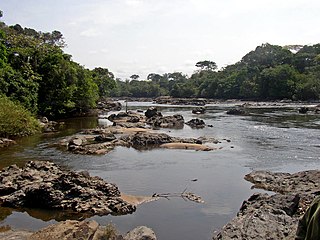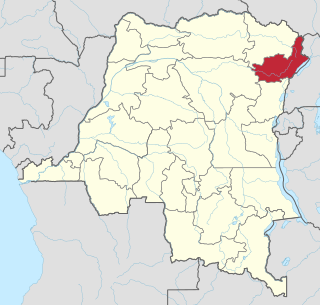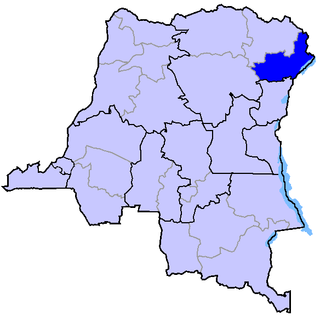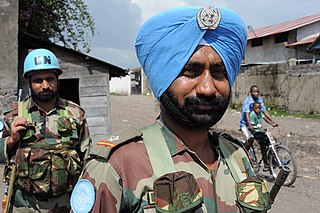
Katanga was one of the eleven provinces of the Democratic Republic of the Congo between 1966 and 2015, when it was split into the Tanganyika, Haut-Lomami, Lualaba and Haut-Katanga provinces. Between 1971 and 1997, its official name was Shaba Province.

North Kivu is a province bordering Lake Kivu in the eastern Democratic Republic of the Congo. Its capital is Goma.

Orientale is one of the eleven former provinces of the Democratic Republic of the Congo. The province lay in the northeast of the country. It bordered Équateur to the west, Kasaï-Oriental province to the southwest, Maniema to the south, and North Kivu to the southeast. It also bordered the Central African Republic and South Sudan to the north, and Uganda to the east. The provincial capital is Kisangani.

The Okapi Wildlife Reserve is a World Heritage Site in the Ituri Forest in the north-east of the Democratic Republic of the Congo, near the borders with South Sudan and Uganda. At approximately 14,000 km², it covers approximately one-fifth of the area of the forest.
The Okapi is a 6×6 mine-protected vehicle (MPV) which can be configured for use in various roles: command and control, fire control post or specialised anti-mine equipment carrier.

The Ituri Rainforest is a rainforest located in the Ituri Province of northeastern Democratic Republic of the Congo formerly called Zaire. The forest's name derives from the nearby Ituri River which flows through the rainforest, connecting firstly to the Aruwimi River and finally into the Congo.

Ituri is one of the 26 provinces of the Democratic Republic of the Congo. Its capital is the city of Bunia.

The Ituri conflict was a major conflict between the agriculturalist Lendu and pastoralist Hema ethnic groups in the Ituri region of the north-eastern Democratic Republic of Congo (DRC). While the two groups had fought since as early as 1972, the name 'Ituri conflict' refers to the period of intense violence between 1999 and 2003. Armed conflict continues to the present day.

Operation Artemis, formally European Union Force (EUFOR) Democratic Republic of the Congo, was a short-term European Union-led UN-authorised military mission to the Democratic Republic of the Congo during the Ituri conflict. ARTEMIS is considered the first military operation led by the EU, the first autonomous EU operation, the first rapid response mission of the EU, first operation outside Europe, first operation applying the principle of the framework nation and first example of "relay operation", conducted in cooperation between the EU and the United Nations. The deployment of EUFOR troops quickly decreased the conflict's intensity. It marked the first autonomous EU military mission outside Europe and an important milestone in development of the European Security and Defence Policy.

The Mining industry of the Democratic Republic of the Congo is a significant factor in the world's production of cobalt, copper, diamond, tantalum, tin, and gold. It is the Democratic Republic of the Congo's largest source of export income. In 2009, the Democratic Republic of the Congo (DRC) had an estimated $24 trillion in untapped mineral deposits, including the world's largest reserves of coltan and significant quantities of the world's cobalt.
The United States Geological Survey estimates that the DRC has 1 million tons of lithium resources.
The Front for Patriotic Resistance in Ituri is a Bunia-based armed militia and political party primarily active in the south of the Ituri Province of northeastern Democratic Republic of the Congo.

The Ituri Interim Administration is an interim body that administers the Ituri region of the Democratic Republic of Congo (DRC). It was established in 2003 by the Ituri Pacification Commission and supported by the UN mission in the DRC.

Radio Okapi is a radio network that operates in the Democratic Republic of the Congo. On an annual budget of USD$4.5 million, a staff of 200 provide news and information to the entire urban population of the DRC. Radio Okapi provides programming in French and in the four national languages of Congo: Lingala, Kituba, Swahili and Tshiluba,

United Nations Security Council resolution 1445 was adopted unanimously on 4 December 2002. After recalling all previous resolutions on situation in the Democratic Republic of the Congo, the Council expanded the military component of the United Nations Mission in the Democratic Republic of Congo (MONUC) to a level of 8,700 military personnel–up from 4,250–in two task forces.

United Nations Security Council resolution 1468, adopted unanimously on 20 March 2003, after recalling previous resolutions on the situation in the Democratic Republic of the Congo, the Council welcomed an agreement on the establishment of a transitional government and requested an increased presence of the United Nations Mission in the Democratic Republic of Congo (MONUC) in the Ituri region in the east of the country amid escalating violence.

The Allied Democratic Forces insurgency is an ongoing conflict waged by the Allied Democratic Forces in Uganda and the Democratic Republic of the Congo, against the governments of those two countries. The insurgency began in 1995, intensifying in 2013, resulting in hundreds of deaths. The ADF is known to currently control a number of hidden camps which are home to about 2,000 people; in these camps, the ADF operates as proto-state with "an internal security service, a prison, health clinics, and an orphanage" as well as schools for boys and girls.
The following lists events that happened during 2012 in the Democratic Republic of the Congo.

The Democratic Republic of the Congo competed at the 2016 Summer Olympics in Rio de Janeiro, Brazil, from 5 to 21 August 2016. This was the nation's tenth appearance at the Summer Olympics since its debut in 1968, although it had previously competed in four editions under the name Zaire.
Cobra Matata is a former leader of the Front for Patriotic Resistance in Ituri (FRPI) and Popular Front for Justice in Congo (FPJC) militias active in the Ituri conflict in the northeastern Democratic Republic of the Congo. He was previously a member of the D.R. Congo armed forces (FARDC), having integrated in 2007 before deserting to reconstitute a rebel group in 2010. In November 2006, Matata had agreed to disarm in exchange for amnesty. In the FARDC, Matata attained the rank of colonel or general. The International Criminal Court classified Matata as Ngiti.















